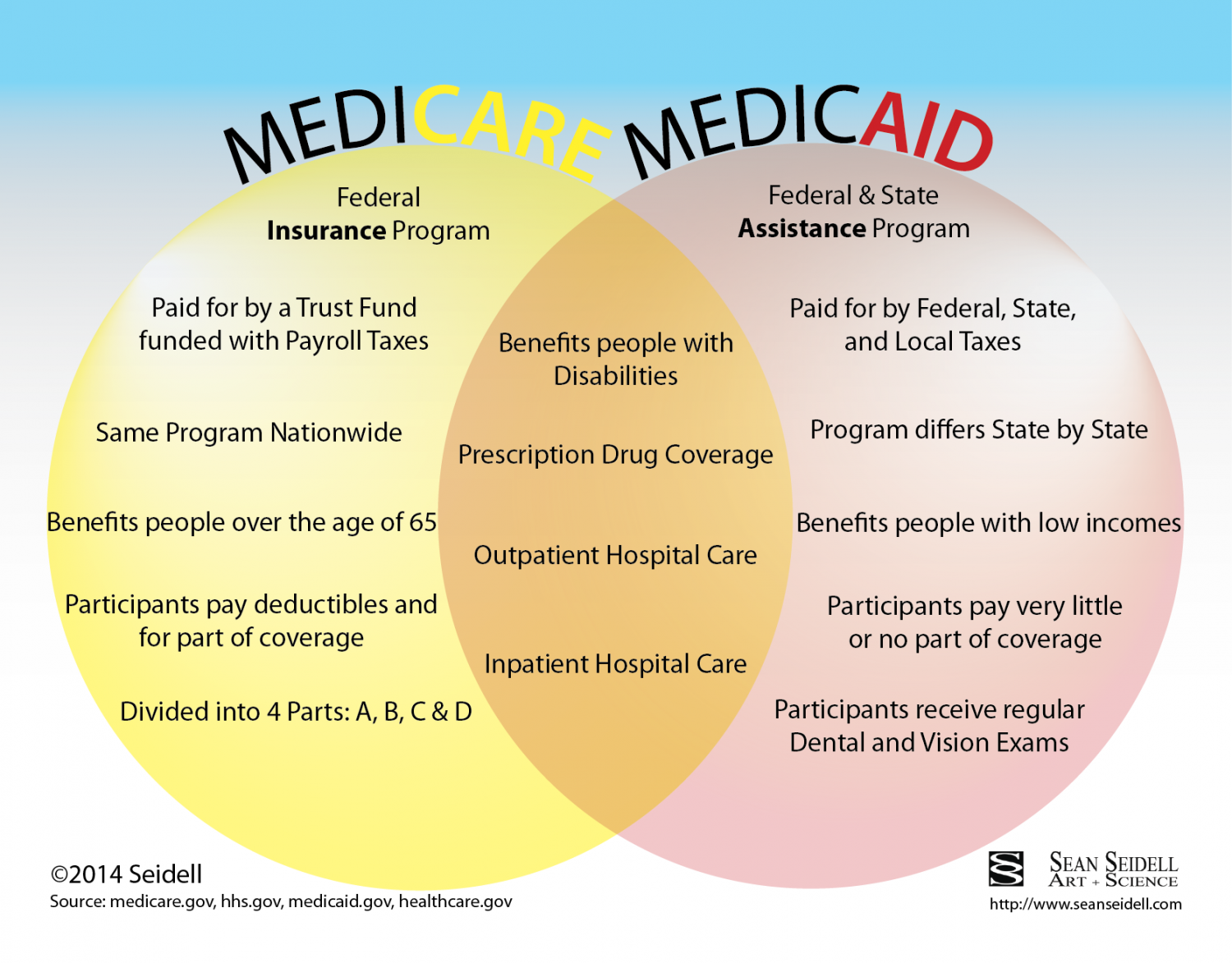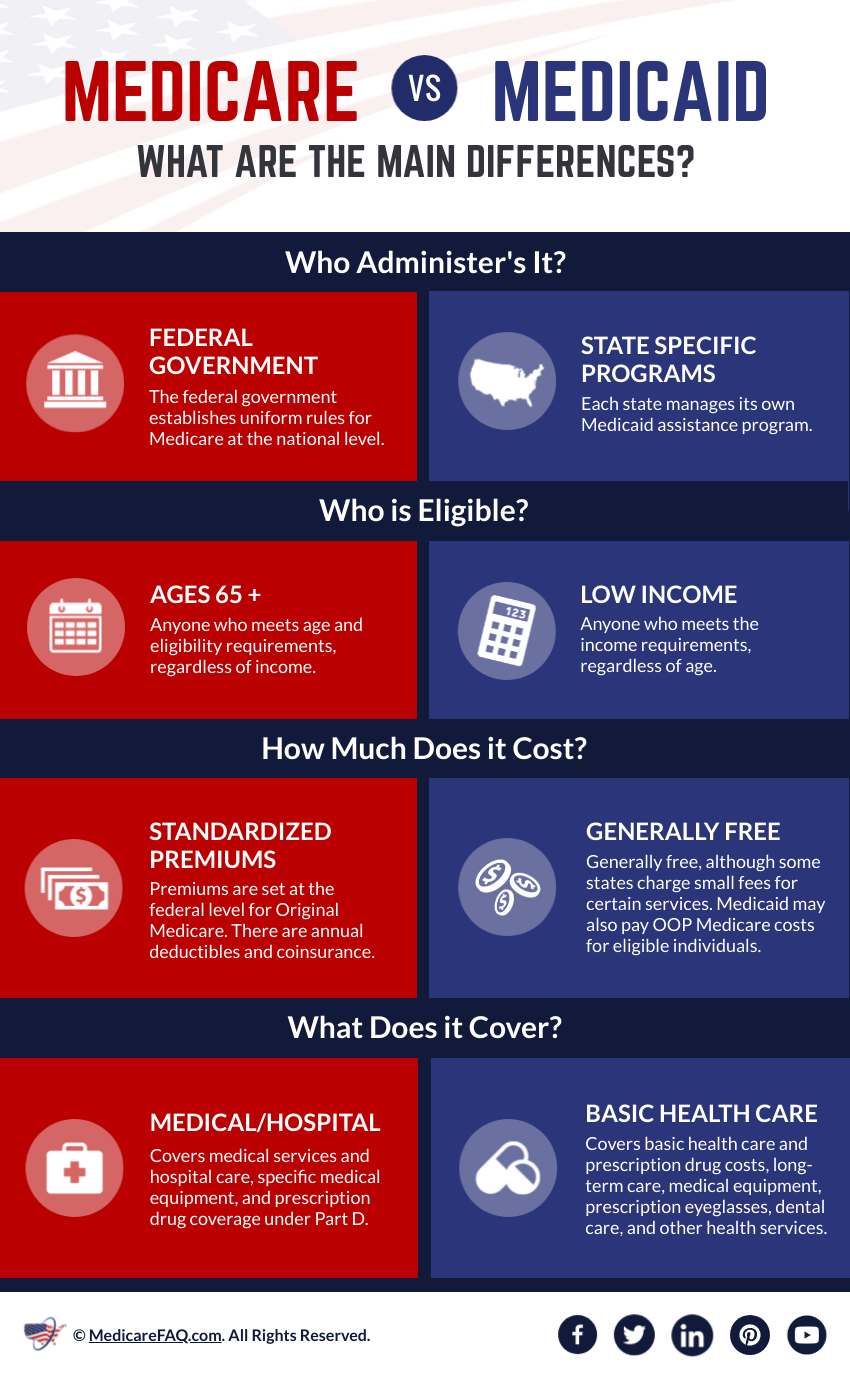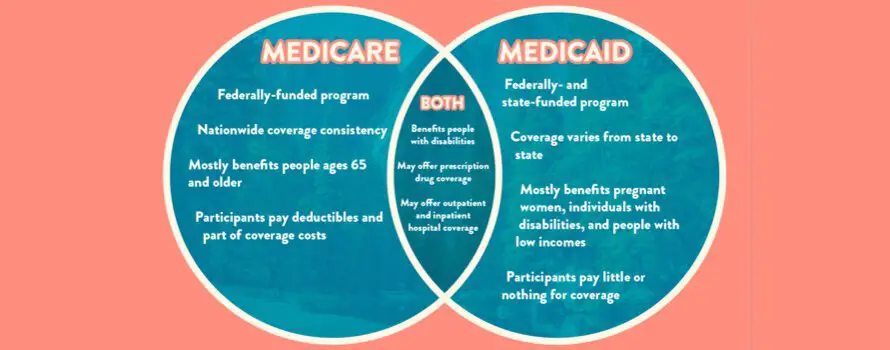Who Does Medicaid Cover
Medicaid, on the other hand, is a healthcare program for low-income individuals who could not otherwise afford health insurance. Nearly 77 million Americans were enrolled in Medicaid as of mid-2021, plus another 7 million enrolled in CHIP.
Medicaid is jointly funded by the federal government and the state in which an enrollee lives. States establish their own eligibility standards and services for Medicaid, within general parameters set by the federal government. Before the Affordable Care Act , most states only provided Medicaid coverage to people who were low-income and also either disabled, elderly, pregnant, children, or the caretaker of a minor child. These populations had to be covered according to federal law.
The ACA included a provision to expand Medicaid eligibility to more adults in every state as of January 1, 2014, but a Supreme Court ruling in 2012 made Medicaid expansion optional. As of 2022, there are still 12 states that have not expanded Medicaid. In the District of Columbia and the 38 states where Medicaid has been expanded, coverage is available for anyone with an income up to 138% of the poverty level .
Heres more information on Medicaid in each state, and where the states are in terms of Medicaid expansion under the ACA.
What Are My Coverage Options Under Medicare
Original Medicare coverage is the same in every state, including eligibility, benefits, and premiums. A Medicare beneficiary pays the same price for Medicare Part B, regardless of where the beneficiary lives .
But a significant portion of Medicares coverage is provided through private plans. The private plan options under Medicare including Medicare Part D , Medigap , and Medicare Advantage vary considerably from one area to another in terms of which insurers offer coverage, the specific plan designs they offer, and the pricing. Most of the general regulations that apply to those plans are the same in every state. State regulations for Medigap plans do vary considerably, however. Federal rules do not require Medigap insurers to offer coverage to disabled enrollees under age 65, but the majority of the states have implemented their own rules to ensure at least some access to Medigap plans for these enrollees. You can click on a state on this map to see applicable Medigap rules.
Filling The Medicare Coverage Gaps
Many people worry about spending too much money on Medicare. The lack of a spending cap and prescription drugs are two reasons people often add additional coverage.
You have options in how you get your Medicare coverage: Original Medicare or Medicare Advantage. Original Medicare doesnt cover prescriptions. Most Medicare Advantage health plans and all Medicare prescription drug plans do offer prescription drug coverage. Medicare Advantage plans also offer additional benefits, coordination of benefits, and often more predictable costs. Therefore, many Medicare recipients join Medicare Advantage plans. However, many individuals prefer Original Medicare and enrollees can also enroll in standalone prescription drug plans, or buy Medicare Supplement insurance policies to fill gaps in coverage.
In addition to annual spending caps, both Medicare Advantage and Medigap plans help pay for the costs youd normally pay under Original Medicare:
- Part A and B deductibles
- Part B coinsurance
- Emergency coverage outside the United States
Recommended Reading: How To Get A Scooter With Medicare
Medicare Vs Medicaid: Whats The Difference
Medicare and all the trimmings that come with it can be confusing and difficult to navigate, even for the experts. Finding the right coverage for the right budget, finding out what, if any, savings you may qualify for, and staying up-to-date with changes to your policy can seem like an overwhelming task. Here we will break down two commonly confused terms: Medicare and Medicaid, and help you determine some key differences when it comes to finding out what program is right for you.
What Services Does Medicaid Cover

Medicaid covers more than 60 percent of all nursing home residents and roughly 50 percent of costs for long-term care services and supports.
Federal rules require state Medicaid programs to cover certain mandatory services, such as hospital and physician care, laboratory and X-ray services, home health services, and nursing facility services for adults. States are also required to provide a more comprehensive set of services, known as the Early and Periodic Screening, Diagnostic, and Treatment benefit, for children under age 21.
States can and all do cover certain additional services as well. All states cover prescription drugs, and most cover other common optional benefits include dental care, vision services, hearing aids, and personal care services for frail seniors and people with disabilities. These services, though considered optional because states are not required to provide them, are critical to meeting the health needs of Medicaid beneficiaries.
About three-quarters of all Medicaid spending on services pays for acute-care services such as hospital care, physician services, and prescription drugs the rest pays for nursing home and other long-term care services and supports. Medicaid covers more than 60 percent of all nursing home residents and roughly 50 percent of costs for long-term care services and supports.
How Much Does Medicaid Cost? How Is It Financed?
Recommended Reading: Are Visiting Angels Covered By Medicare
Can One Have Dual Eligibility For Both Medicare And Medicaid
Yes, Medicare and Medicaid are not mutually exclusive programs. Persons who are eligible for both are referred to as having Dual Eligibility, Dual Eligibles, or often simply Duals. Medicare is the first payer of covered benefits, while Medicaid is the secondary payer.
Typically, Medicaid will pay for Medicare premiums and co-payments for dual eligibles. In fact, many states have special programs intended to make it easier for seniors to manage their dual eligibility status, as it can be confusing to know where to turn for what services. This is generally in the form of managed care.
There are also programs called Medicare Saving Programs for low-income seniors that dont quite qualify for Medicaid.
How Effective Is Medicaid
Medicaid is very effective in providing health insurance coverage to the most vulnerable. Since the ACAs major coverage expansions took effect in 2014, Medicaid has helped to reduce the number of uninsured from 45 million to 29 million. If Medicaid did not exist, most of the tens of millions of Medicaid enrollees would be uninsured. This is because private health insurance is generally not an option for Medicaid beneficiaries: many low-income workers do not have access to coverage for themselves and their families through their jobs and cannot afford to purchase coverage in the individual market. The creation of Medicaid, subsequent expansions of Medicaid coverage to children and pregnant women in the 1980s and 1990s, and the most recent expansion of Medicaid coverage to low-income adults under the ACA all have led to significant drops in the share of Americans without health insurance coverage.
Medicaid is also effective in improving access to care, in supporting financial stability among low-income families, and in improving health outcomes. Some of the clearest evidence comes from the ACA expansion of Medicaid coverage to low-income adults, which provides a recent natural experiment, letting researchers compare outcomes in states that did and did not adopt the expansion.
You May Like: Does Medicare Have Silver Sneakers
Can You Have Medicare And Medicaid
People who have Medicare may also get Medicaid to help pay the monthly premiums and out-of-pocket costs like deductibles of their program. If you can get both, you are deemed “dual eligible.”
Medigap is an add-on health plan for Medicare that may help cover co-pays and deductibles if you can’t get Medicaid.
Which Is Better Medicare Or Medicaid
Both federal programs are crucial in helping low income Americans afford medical expenses. Medicaid benefits are based on financial need and are more widely available for people of all ages. It also provides more complete coverage than Original Medicare, as it pays for some drugs and additional services such as nursing home care, personal care, dental, vision, and hearing. If you dont meet your states Medicaid eligibility, Medicare is a significant government benefit if you qualify.
Recommended Reading: Do I Have To Pay For Medicare On Ssdi
How Medicaid Works With Medicare
If you have both Medicare and Medicaid, you dont have to worry about which one pays first. Theres a system called coordination of benefits that decides the insurer that pays first.
If you have both Medicare and Medicaid, Medicare pays for care first. Medicaid is considered the secondary payer. Just make sure to get care from providers who accept both plans. Otherwise, you could pay more out-of-network costs if the provider doesnt take both.
Can You Have Both Medicare And Medicaid
Yes, its possible to have both Medicare and Medicaid. People who receive both Medicare and Medicaid benefits, usually low-income seniors, are called dual eligible. Many insurance companies provide Medicare Advantage plans, called D-SNPs , for people in this situation. If you have both types of benefits, Medicare will pay first.
Learn more about Medicare dual eligibility. Or call a licensed sales agent. Whether you qualify as a dual eligible or not, an agent can help you understand your Medicare options and search for plans in your area.
Content on this site has not been reviewed or endorsed by the Centers for Medicare & Medicaid Services, the United States Government, any state Medicare agency, or any private insurance agency . Eligibility.com is a DBA of Clear Link Technologies, LLC and is not affiliated with any Medicare System Providers.
Recommended Reading: What Does Medicare Part A And B Not Cover
What Does It Cost
The cost for Medicare varies depending on the type of plan you have. Although some Medicare Advantage Plans have $0 premiums, most people will pay premiums, deductibles, and copays. States offer Medicare Savings Programs to help cover these out-of-pocket costs.
Most people who receive Medicaid dont have to pay anything for healthcare services. However, certain Medicaid expansion programs can come with added costs.
Disability Can Make You Dual Eligible

You could be eligible for Medicare and Medicaid if youre on disability:
- Youre eligible for Medicare if youre on Social Security Disability insurance . However, you have to receive two years worth of SSDI payments before becoming eligible.
- Youre eligible for Medicaid if youre approved for Supplemental Security Income . Theres no waiting period, so you can get Medicaid immediately.
You May Like: When Does Medicare Start Age
What Are Dual Health Plans
Dual health plans are designed just for people who have both Medicaid and Medicare. Theyre a special type of Medicare Part C plan. Dual health plans combine hospital, medical and prescription drug coverage. Youll keep all your Medicaid benefits. Plus, you could get more benefits than with Original Medicare. And you could get it all with as low as a $0 plan premium.
View the “Do I Lose My Medicaid Benefits?” article.
Opting For Part A Only
Some people choose only to have Medicare Part A coverage so that they dont have to pay the monthly premiums for Medicare Parts B and D. If you still have insurance through a current employer , you can add the other parts later with no penalty.
However, if you decline Parts B and D and don’t have another insurance plan in place, you’ll face a late enrollment penalty when you add the other parts later.
In the past, Medicaid programs typically didn’t offer a lot of choice in terms of plan design. Today, most states utilize Medicaid managed care organizations . If there’s more than one MCO option in your area of the state, you will likely be given the option to select the one you prefer.
Read Also: How Much Does Medicare Part B Cost For A Couple
Medicaid Eligibility And Costs
The federal and state partnership results in different Medicaid programs for each state. Through the Affordable Care Act , signed into law in 2010, President Barack Obama attempted to expand healthcare coverage to more Americans. As a result, all legal residents and citizens of the United States with incomes 138% below the poverty line qualify for coverage in Medicaid participating states.
While the ACA has worked to expand both federal funding and eligibility for Medicaid, the U.S. Supreme Court ruled that states are not required to participate in the expansion to continue receiving already established levels of Medicaid funding. As a result, many states have chosen not to expand funding levels and eligibility requirements.
Those covered by Medicaid pay nothing for covered services. Unlike Medicare, which is available to nearly every American of 65 years and over, Medicaid has strict eligibility requirements that vary by state.
However, because the program is designed to help the poor, many states have stringent requirements, including income restrictions. For a state-by-state breakdown of eligibility requirements, visit Medicaid.gov.
When Medicaid recipients reach age 65, they remain eligible for Medicaid and also become eligible for Medicare. At that time, Medicaid coverage may change based on the recipient’s income. Higher-income individuals may find that Medicaid pays their Medicare Part B premiums. Lower-income individuals may continue to receive full benefits.
Youre Our First Priorityevery Time
We believe everyone should be able to make financial decisions with confidence. And while our site doesnt feature every company or financial product available on the market, were proud that the guidance we offer, the information we provide and the tools we create are objective, independent, straightforward and free.
So how do we make money? Our partners compensate us. This may influence which products we review and write about , but it in no way affects our recommendations or advice, which are grounded in thousands of hours of research. Our partners cannot pay us to guarantee favorable reviews of their products or services.Here is a list of our partners.
Don’t Miss: What Mental Health Services Does Medicare Cover
How Does Medicare Differ From Medicaid
Medicare is a federal program administered by the Centers for Medicare and Medicaid Services . It provides healthcare coverage to those over 65 and those with disabilities. It is paid for by Social Security payroll taxes.
Medicaid is funded jointly by state and federal governments. It provides healthcare for people with low incomes and resources and is funded by taxes.
Medicare Vs Medicaid: Compare Benefits
In the context of long-term care for the elderly, Medicares benefits are very limited. Medicare does not pay for personal care . Medicare will pay for a limited number of skilled nursing days following hospitalization no more than 100 days for a minimum of 3 days. Medicare will also pay for some home health care, provided it is medical in nature. In recent years, some Medicare Advantage plans started offering long-term care benefits. These services and supports are plan-specific. But they may include:
- Adult day care
Read Also: Can You Use Medicare Out Of State
Unitedhealthcare Connected For Mycare Ohio
UnitedHealthcare Connected® for MyCare Ohio is a health plan that contracts with both Medicare and Ohio Medicaid to provide benefits of both programs to enrollees. If you have any problem reading or understanding this or any other UnitedHealthcare Connected® for MyCare Ohio information, please contact our Member Services at from 7 a.m. to 8 p.m. Monday through Friday for help at no cost to you.
Si tiene problemas para leer o comprender esta o cualquier otra documentación de UnitedHealthcare Connected® de MyCare Ohio , comuníquese con nuestro Departamento de Servicio al Cliente para obtener información adicional sin costo para usted al de lunes a viernes de 7 a.m. a 8 p.m. .
America’s Foremost Disability Expert

3 Things You Must Know About Social Security Disability Claims
Are you eligible?
Self-help services may not be permitted in all states. The information provided on this site is not legal advice, does not constitute a lawyer referral service, and no attorney-client or confidential relationship is or will be formed by use of the site. The attorney listings on this site are paid attorney advertising. In some states, the information on this website may be considered a lawyer referral service. Please reference the Terms of Use and the Supplemental Terms for specific information related to your state. Your use of this website constitutes acceptance of the Terms of Use, Supplemental Terms, Privacy Policy and Cookie Policy. Do Not Sell My Personal Information
Recommended Reading: Is United Healthcare A Good Medicare Supplement
What Does Medicare Cover
Medicare comes in four different parts, each responsible for covering different health care costs:
-
Medicare Part A covers inpatient medical services and supplies. Think of it as hospital insurance.
-
Medicare Part B covers outpatient medical services and supplies. Think of it as doctor insurance.
-
Medicare Part C is a private alternative to Original Medicare. It must cover everything Medicare Part A and Medicare Part B covers, but most plans known as Medicare Advantage plans cover additional services, including vision, dental, hearing and prescription drug coverage.
-
Medicare Part D is prescription drug coverage beneficiaries purchase through federally approved private health care insurers.
Your specific coverage varies depending on what route you go. The big choice Medicare beneficiaries face is whether to opt for Original Medicare and purchase a Medicare Part D plan or to enroll in Original Medicare and purchase a Medicare Part C plan to serve as their primary coverage.
Our partner Via Benefits can help you compare and purchase Medicare plans in your area.
Can You Have Both
People who qualify for both Medicare and Medicaid are considered dual eligible. In this case, you may have original Medicare or a Medicare Advantage plan , and Medicare will cover your prescription drugs under Part D.
Medicaid may also cover other care and drugs that Medicare doesnt, so having both will probably cover most of your healthcare costs.
Also Check: How Much Does Medicare Pay For Dialysis Transport
